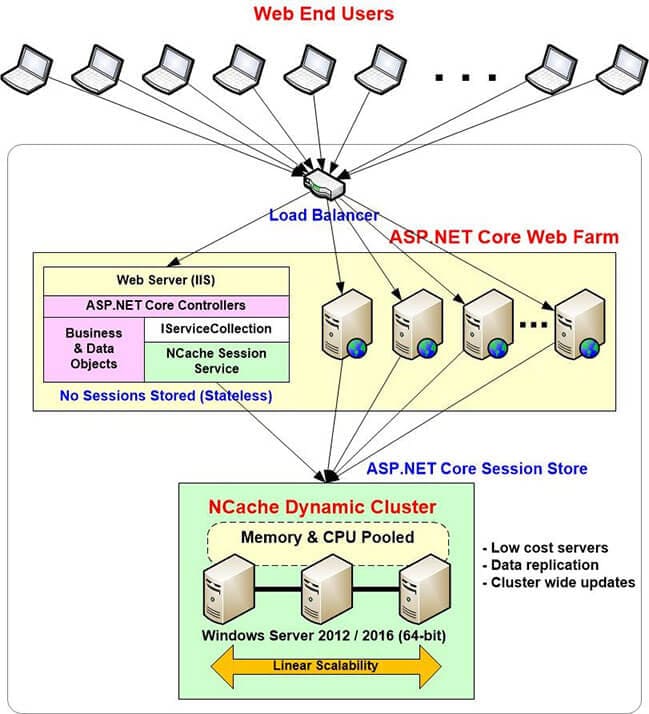ASP.NET Core Session Provider by NCache
In ASP.NET Core applications, a session state is essential for storing user-specific data, but default session providers can slow down under high traffic and struggle with performance and scalability.
Supercharge ASP.NET Core Sessions
NCache ASP.NET Core Session Provider solves these issues by providing an in-memory, distributed caching solution that ensures high availability, reliability, and scalability for session data. With NCache, your session storage remains fast and responsive and eliminates session loss caused by application restarts or server failures.

Key Benefits of Using NCache for Sessions
- Performance Boost: NCache stores session data in memory, applications experience sub-millisecond latency and better responsiveness. Sessions are quickly retrieved without hitting slower databases, which provides a seamless user experience.
- High Availability through Replication: No session data will be lost. NCache provides fault-tolerant and highly available solutions for mission-critical applications by ensuring session data replication across multiple cache servers and supports automatic failover.
- Linear Scalability: With increasing traffic, you can simply add more NCache servers to the cluster. This enables session storage to scale dynamically without performance degradation, n thus your web applications will be able to handle increasing workloads without a problem.
- Optimized for Speed: NCache uses an efficient compact serialization mechanism that makes session data storage and retrieval incredibly fast with minimal overhead.
NCache vs. Default SQL Session Provider
- Storage: In-Memory (NCache) vs. Disk-based (SQL)
- Scalability: Linear scaling (NCache) vs. Bottleneck-prone (SQL)
- Locking: Distributed locking (NCache) vs. Row locking (SQL)
Seamless Configuration of ASP.NET Core Sessions
Integrating NCache as the session provider in ASP.NET Core is straightforward. Simply configure it in the Program.cs file using the following snippet:
var builder = WebApplication.CreateBuilder(args);
// Add services to the container
builder.Services.AddControllersWithViews();
// Set up MVC Services
builder.Services.AddMvc();
// Configure NCache Session State
builder.Services.AddNCacheSession(options =>
{
options.CacheName = "demoCache";
options.EnableLogs = true;
options.UseJsonSerialization = true; // To avoid the Binary Format error
options.SessionAppId = "demoApp";
options.SessionOptions.IdleTimeout = 5; // Session expires after 5 minutes
options.SessionOptions.CookieName = "AspNetCore.Session";
});With this simple configuration, ASP.NET Core sessions are stored and retrieved seamlessly from NCache, eliminating the need for SQL-based session storage. Most importantly, this requires zero code changes to your existing controllers or application logic.
Sessions in Multiple Regions / Zones
- WAN Replication of ASP.NET Core Sessions: NCache allows the replication of all ASP.NET Core sessions across a Wide Area Network (WAN) to another region or data center. This feature ensures that your sessions are never lost, even if a specific region or zone experiences downtime.
- Multi-Site ASP.NET Session State: For scenarios where replicating all sessions across the WAN might be bandwidth-intensive, NCache offers a multi-site session feature. In this setup, session data remains in its originating location but can seamlessly move with the user if traffic is redirected to another region or zone. This active-active deployment approach keeps applications running smoothly without unnecessary data replication.
By leveraging these features, NCache ensures that your application's session management is resilient, scalable, and optimized for multi-region deployments.
Advanced Session Features
- Distributed Session Locking (Data Integrity): NCache gives great control over session locking to avoid conflicts in concurrent session updates while maintaining high performance.
- Diagnostic Logging & Monitoring: Easily troubleshoot session-related issues with detailed logs. NCache offers in-depth debugging and monitoring to keep your session storage running smoothly.
Real-World Use Cases
NCache is ideal for high-traffic ASP.NET Core applications, including:
- E-commerce websites: Handle millions of concurrent users simultaneously with high-speed session storage, ensuring seamless shopping experiences.
- Online banking platforms: To support secure transactions and user authentication, provide highly available and secure sessions.
- Multi-server applications: Maintain session consistency across multiple server instances, ensuring smooth operation in distributed environments.
- Distributed web apps: Run applications in cloud and hybrid environments with reliable session replication, supporting multi-region deployments.
Get Started with NCache
Integrate NCache ASP.NET Core Session Provider today and take your session management to the next level.
What to Do Next
Frequently Asked Questions (FAQ)
IDistributedCache interface.
This allows you to plug NCache into your application as a drop-in replacement for standard
sessions without modifying your existing controller code.